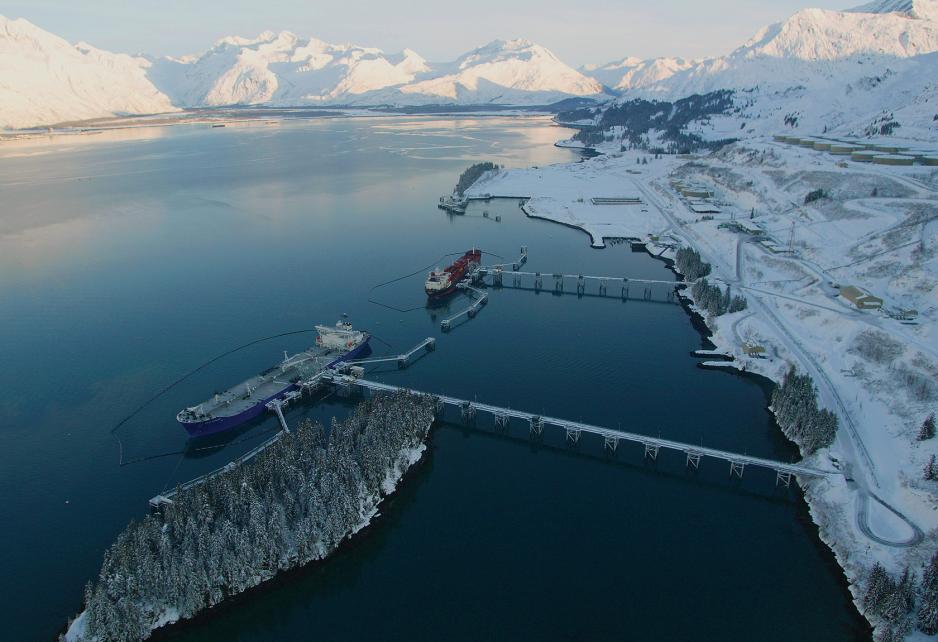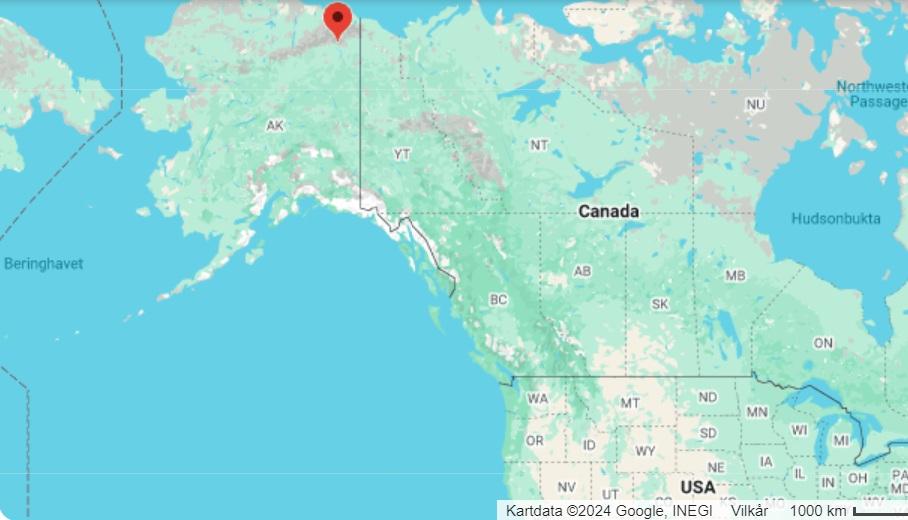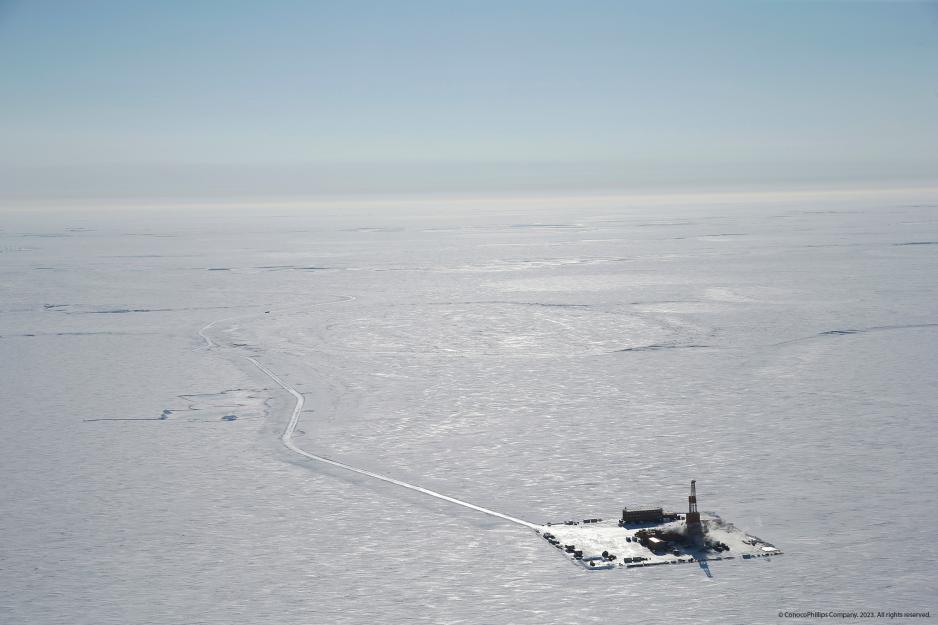Increased Oil Drilling in Alaska on the Agenda With New Trump Administration

The Trans-Alaska Pipeline runs through Alaska; from the oil fields in the north of the state, to the Valdez Marine Terminal in the south (pictured). Here, the oil is loaded onto tankers for shipment to the international market. The 800-mile long pipeline is one of the world's longest pipeline systems and its construction was finished in 1977. (Photo: ConocoPhillips Company).
The oil and gas industry plays a crucial role in the economy of Alaska, but many Alaskans are also torn on the issue of increased oil drilling, says longtime journalist in Alaska, Larry Persily. He shares his view on what a new Trump administration will mean for oil and gas development in the US' Arctic state.
A new presidential term with Donald Trump could entail new thrusts for increased oil development in the north of the US Arctic state of Alaska.
Trump has highlighted oil and gas extraction in Alaska a number of times during his campaign, and he has particularly emphasized the potential for oil drilling in the Arctic National Wildlife Refuge (ANWR).
The wildlife refuge is located in the north of the enormous state, which is almost twice the size of Texas, and borders Canada in the East.

The Arctic National Wildlife Refuge is located in the northeast corner of Alaska and stretches across an area of over 78,000 square kilometers (almost the size of Austria).
Alaska's oil on the agenda
As reported by Bloomberg, Trump is said to have discussed oil drilling in the Alaska Arctic Refuge with the Senate Republicans during a meeting this summer. He also expressed support for oil extraction in the ANWR in a phone call with Republican Nich Begich, who currently leads in the race for Alaska's only seat in the US House of Representatives.

Republican Governor Mike Dunleavy of Alaska. Dunleavy has been Governor in Alaska since 2018. (Photo: State of Alaska/Office of the Governor).
Shortly after Donald Trump won the presidential election, Alaska's Governor Mike Dunleavy (R) commented on what the incoming presidency could encompass for Alaska in a live Facebook video.
"He [Donald Trump, ed. note] is going to help us. And really take advantage of our opportunities here in Alaska. He sees Alaska's oil resources, our gas resources, our mining reseources, our timber resources, (...) our military, as assets not just for Alaska, but as solutions for the country's problems," Dunleavy said.
"I would anticipate more opportunities in oil, more opportunities in gas. We are getting closer and closer to realizing a large gas line in the state of Alaska," he continued and added that he thinks Alaska soon will be a player in the gas world internationally.
Largest contributor to state revenues
In an interview with High North News, publisher of the Alaska-based newspaper Wrangell Sentinel, Larry Persily, shares his thoughts on oil and gas development in Alaska with the incoming Trump-administration.

Larry Persily is a publisher for the Alaska-based newspaper Wrangell Sentinel.
Persily has covered oil and gas, government and budget issues in Alaska as a journalist for 25 years, and has held the Atwood Chair of Journalism at the University of Alaska, Anchorage. He has also worked on oil and gas issues for the federal and municipal governments, in addition to state government.
The longtime journalist notes the significant role that oil and gas already plays in the economy of Alaska.
"While the oil and gas industry is not the largest employer in the state as measured by number of jobs – by far not the largest, which would be tourism, fishing and all governments – it is the largest contributor to state government revenues, dwarfing the minimal revenues from taxing non-oil and gas corporations, motor fuel, commercial fish harvests and cruise ship passengers a.o."
What do you anticipate will happen with regards to oil and gas development in Alaska with the incoming Trump-administration?
"I would expect the Trump administration will put up more acreage for oil and gas exploration for bid, along with loosening restrictions and environmental permitting requirements on resource development – to the extent allowed by law and legal challenges," Persily tells HNN.
"The big question is whether oil and gas companies with the financial wherewithal to work in Alaska submit bids, or whether the bids attract undercapitalized speculators that lack the pocketbook to develop prospects in high-cost Alaska."
The words "Arctic" and "oil" do not play well together for many people.
What are your thoughts on the new Trump-presidency and development of the Arctic National Wildlife Refuge?
"I expect the new administration will push for more acreage in ANWR going out for bid. But I would be surprised if any major oil company, or even any middle oil company submits bids. It is a high cost, highly speculative play," Persily notes.
He emphasizes that any efforts to develop ANWR will certainly attract negative international attention.
"The words "Arctic" and "oil" do not play well together for many people. The bigger companies have no interest in fighting those battles, putting billions of dollars at risk for something that may not pay out for a decade or more. It's just bad business."
Biden wanted to limit
The debate about oil drilling in the Arctic National Wildlife Refuge has occurred over several years. Extraction in the wildlife reserve was forbidden for decades, but a bill from 2017, during the previous Trump administration, lifted the ban and allowed the sale of licenses for oil extraction in the refuge's coastal plains (area 1002).
The bill required the US federal government to hold two lease sales in the coastal plains area. One has already been held, and some licenses were sold to minor companies, which later withdrew from the leases. The main bidder was the state's development agency, Alaska Industrial Development and Export Authority (AIDEA).

Map of the northernmost areas of the state of Alaska. The green field at the left shows the National Petroleum Reserve - Alaska, while the green field at the right is the Alaska National Wildlife Refuge (ANWR). (Photo: US Geological Survey)
The biggest oil companies however, showed no significant interest. Later, the Biden administration also canceled the AIDEA license, citing a lack of environmental analyses, writes Alaska Public Media.
The second sale is to be held before the end of 2024, per the bill. Shortly after it was revealed that Trump would be the next US president, the Biden administration presented new guidelines for the sale of licenses in a new plan from the US Bureau of Land Management.
Alaska Public Media reports that the plan proposes much more limited oil development than the previous Trump administration's proposal and includes additional environmental restrictions.
In April 2024, the Biden administration also finalized legislation to ban fossil fuel drilling on nearly half of the National Petroleum Reserve, west of northern Alaska (see map above). In 2023, Biden approved ConocoPhillips' oil project in the NPR, which caused great opposition among the environmental movement and Alaska Indigenous communities.

From ConocoPhillips Willow oil project in western parts of Alaska's North Slope region. The company is Alaska's largest oil producer. (Photo: ConocoPhillips Company).
"Alaskans are torn"
How does the people of Alaska view increased oil and gas development in the state, Persily?
"Alaskans are torn, he says and explains that they on the one hand enjoy the money and jobs and free public services funded by oil tax and royalty dollars paid to the state treasury.
With regards to the importance for the state of Alaska, he says oil and gas taxes and royalties are second only to investment income from the state's oil wealth savings account as to paying the bills for education, roads and all the other spending in the state budget.
"On the other hand, many are scared by climate change and the damages it causes, particularly in coastal communities. Alaska collectively needs intense group therapy to resolve the conflict," he continues.
"In the end, one of the most important issues is the cost. The oil price will be a very important indicator."
"Many years until a possible extraction"
Senior Researcher Arild Moe at the Fridtjof Nansen Institute in Norway says there is no doubt that Trump holds different priorities in this area than Biden, but also emphasizes the regulatory uncertainty and time dimension needed to develop such oil projects.

Senior Researcher Arild Moe at the Fridtjof Nansen Institute. (Photo: FNI).
"With Trump as the president, there is once again talk of liberalization. But what happens the next time? This has gone back and forth since Obama's time as president, and this is a problem for the industry," he emphasizes.
"In these areas, it will not be like "sticking a straw" in the ground and start drilling for oil. The area must be explored first, and there could be many years before production starts – if worthwhile discoveries are made. In other words, this period will stretch across several presidential administrations, which puts a damper on the interest."
Reputational risk
Echoing Persily, Moe also emphasizes that companies must consider the reputational risk with projects like these at the ANWR.
"There are different opinions in the oil industry, but the major companies often do not want to be associated with controversial projects in this area, which could entail that these would not be interested in bidding on licenses."
He explains that this mainly applies to the big companies with a lot of exposure in the market, with well-known brands and gas stations, which will be especially careful not to damage their reputation. Smaller companies, which do not sell to end markets but to other companies, could have less of that type of fear.
"In the end, one of the most important issues is the cost. What will the costs be to extract possible reserves compared to the oil market and the oil price? The oil price will be a very important indicator."




